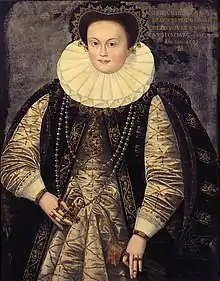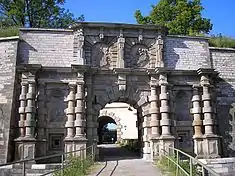Sophie of Brunswick-Lüneburg
Sophie of Brunswick-Lüneburg (30 October 1563 – 14 January 1639) was a member of the House of Brunswick-Lüneburg and margravine of Brandenburg-Ansbach and Brandenburg-Kulmbach and Duchess of Krnov by marriage.
| Sophie of Brunswick-Lüneburg | |
|---|---|
 Sophie of Brunswick-Lüneburg | |
| Born | 30 October 1564 Celle |
| Died | 14 January 1639 (aged 74) Nuremberg |
| Spouse | George Frederick, Margrave of Brandenburg-Ansbach |
| Father | William, Duke of Brunswick-Lüneburg |
| Mother | Dorothea of Oldenburg |

Life
Sophie was the eldest child of Duke William the Younger of Brunswick-Lüneburg (1535–1592) from his marriage to Dorothea of Denmark, a daughter of King Christian III of Denmark.

On 3 May 1579 she married Margrave George Frederick I of Brandenburg-Ansbach-Kulmach (1539–1603) in Dresden.[1] George Frederick was the last of the older line of Frankish Hohenzollerns and was simultaneously Margrave of the Principality of Ansbach and Kulmbach, Silesian duke of the Duchy of Krnov and guardian administrator of the Duchy of Prussia. As such, he was a powerful figure of his time. His first wife, Elisabeth of Brandenburg-Küstrin, had died in 1578, and like his first, George Frederick's second marriage remained childless, which is why his inheritance needed to be regulated by the House Treaty of Gera. Sophie's childlessness motivated her husband to increased interest in the policy of the wider House of Hohenzollern.[2]
After her husband died in 1604, Sophie returned to her birth family.[3] She survived her husband by 36 years. Sophie often stayed in Nuremberg with her sisters Clara, Countess of Schwarzburg, and Sibylle, Duchess of Brunswick-Dannenberg.[4] She died in Nuremberg in 1639 and was buried in the St. Lorenz Church there.[5]
The Renaissance portal of Wülzburg Castle shows George Frederick's coat of arms next to Sophie's.[6]
Footnotes
- Adolph Friedrich Riedel: Codex diplomaticus Brandenburgensis: Collection of documents, chronicles and other documentary sources for the history of the Mark Brandenburg and its rulers, Volume 1, F.H. Morin, 1867, p. 243
- Andrea Baresel-Brand: Grave monuments of northern European royal houses in the Age of the Renaissance 1550-1650, volume 9 of Construction + Art, Verlag Ludwig, 2007, p. 145
- Erik Margraf: The marriage sermon of the early modern period, Herbert Utz Verlag, 2007, p. 274
- Franz von Soden: War and moral history of the city of Nuremberg, Bläsing, 1860, pp. 11, 64, 478
- "Heilsbronn - die Grablege der Markgrafen". Archived from the original on 2009-12-19. Retrieved 2011-05-01.
- Daniel Burger: The rural fortresses of the Hohenzollerns in Franconia and Brandenburg in the Age of the Renaissance, Beck's Publishing House, 2000, p. 132